Incredible Analysis - Blog Posts
You Say Potato, I Say Excellent! Or blocking, accents and legacy of morality tales in ‘The Resurrectionists’ minisode PART II
Alternate title: how Aziraphale’s naivety in this episode was supposed to make you a bit outraged
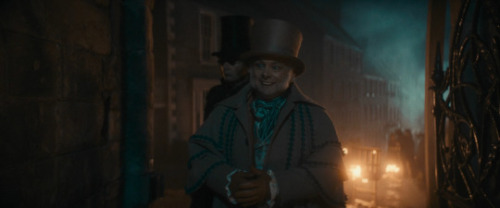
I have to shout out to @bowtiepastabitch for their AMAZING historical analysis of this minisode - it prompted me to finish this long ramble that has been drifting in my notes. Anyway, I have a major obsession with the ways blocking and dialogue interplay in Good Omens - you can check out my analysis of the blocking in the flashbacks in S1. But The Resurrectionists is really something special. This got so long I am splitting it into two parts.
What we see in this minisode is a morality tale - a genre of children’s literature that was extremely popular in the early 1800s where the minisode is taking place. Catch up on the historical background in Part I.
When looking at this minisode, it is really important to look at two complementary narrative tools - Crowley’s accent and the placement of Aziraphale in relation to Crowley. Through the minisode, Crowley switches between his standard English accent and a delightful Scottish accent. But the switching isn’t random!
Scottish lines = character Demon Crowley, who moves the plot of the story along
English lines = Crowley, the moral guide leading Aziraphale
Additionally, the two of them swap sides in their blocking frequently in this episode. Their standard placement is A/R + C/L but the swap to C/R + A/L is almost the norm in this minisode.
Analyzing Blocking and Dialogue
We open in the graveyard, with Aziraphale and Crowley in their standard placement, observing the statue of Gabriel. But then they notice Elspeth, digging up a corpse. When Aziraphale approaches Elspeth to inform her that her actions are Not Good, he actually ends up swapped with Crowley and finds himself on the left because what he is doing - making moral judgments on the actions of Elspeth with no understanding of what led her here - is doing Good, not good.

The next scene finds Crowley helping Elspeth cart the corpse away from the graveyard, while the trio debate all the other ways Elspeth could make money - Aziraphale suggests running a bookshop, farming, weaving, giving the standard Good party line about hard work blah blah blah. Aziraphale remains on the left - after all, those supposed options are completely unrealistic, unobtainable professions for someone in Elspeth's socioeconomic position. They aren't remotely helpful suggestions.
Aziraphale only finds himself back on the right when he and Crowley are introduced to Wee Morag, and have some time to listen and observe the reality of their situation.
Then, off we go to complete our journey to sell the body. Aziraphale and Crowley find themselves having a debate about morality, but Aziraphale is again ON THE LEFT as he waxes poetic about the virtues of poverty - doing Good, not good again. What I loved here was you saw the clear purpose between Crowley’s two accents as he switched mid-line -

Crowley: (SC) Oh, I'm down with wicked! (EN) Anyway, is it wicked? She needed the money.
Upon reaching the lodging of Mr. Dalrymple, FRCSE, Crowley and Aziraphale take their standard places but this scene has one really important moment that I want to highlight. When they open the barrel to find the rotted corpse, the look on Crowley’s face is so telling. He often finds Aziraphale’s machinations amusing even when they are annoying, but here he looks decidedly disappointed. Aziraphale might have done Good by rendering the body unsellable, but what good did it do? The body is still been un-interred. Elspeth has wasted her energy, and has made a terrible first impression of the surgeon whom she needs to pay her for her services. It looks like Crowley wants to say something, but he stops himself and clenches his jaw. The PATIENCE he is showing to Aziraphale - this is a quality that Crowley has in SPADES but we really see him exercise it here.
After the discussion with Mr. Dalrymple, in which Aziraphale realizes the importance of dissections for educating medical students and thus leading to better care for the living, he asks the right question - why should the poor have to risk death to obtain bodies? But he let's himself get sidetracked by a blatant appeal to his emotions...
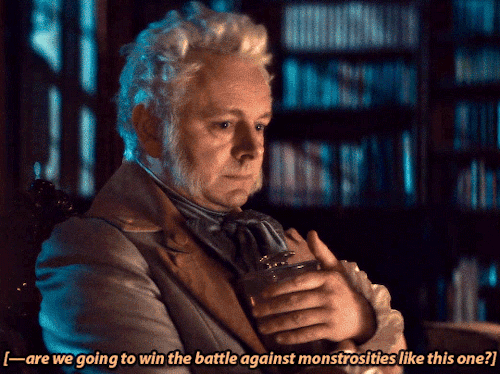
At this point, Aziraphale goes all in on body snatching being Good. Which... it still isn't because it is based on a broken system that disadvantages the poor? FOCUS, angel. He even goes as far as to offer to help Elspeth and Wee Morag in obtaining another corpse but note that again, he is on the LEFT -
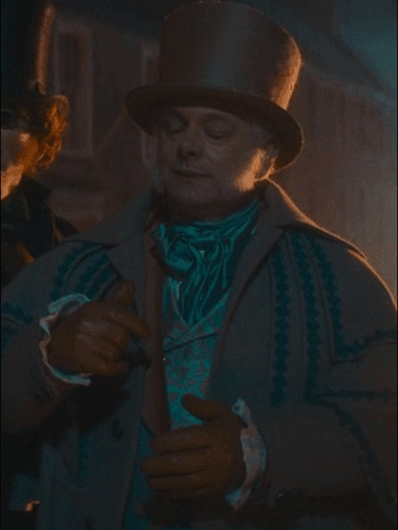
Remember, Wee Morag is deeply conflicted about the morality of body snatching, and instead of explaining anything to her (like, that having your body dissected won't keep you out of heaven would be start) Aziraphale just sort of joins Elspeth in pressuring her to join in - which is pretty awful and coercive, but gee if that isn't just heaven's playbook for doing Good, not good.
So we return to the graveyard, and this is where everything goes sideways. Aziraphale spends basically this entire sequence on the left. First, he notices the ingenuity of the grave guns but fails to acknowledge the travesty of so much energy being spent on protecting wealthy corpses while the poor suffer. Then, the tragedy strikes. After Wee Morag is shot, Aziraphale wastes time justifying saving her, resulting in her dying before he can act. And after all this, after the heart break of seeing her partner die, we see Elspeth come to the logical conclusion. If body snatching is Good, then might as well take Wee Morag off to Mr. Dalrymple, right?
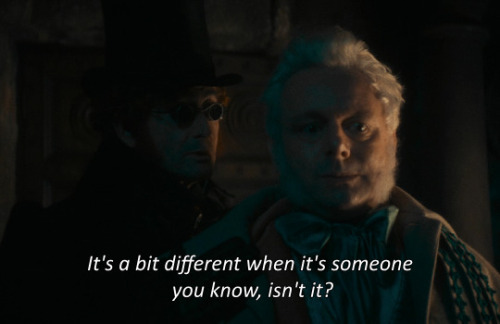
What shouldn't be overlooked is what takes place when Elspeth gets Wee Morag's body to Mr. Dalrymple. Because while Aziraphale is very clearly illustrating the dangers of black and white morality through religion, Dalrymple is showing that black and white morality through science is just as bad. Dalrymple has unshakable belief in the power of science and knowledge to alleviate human suffering and sees his work at Good. He cares about preventing illness, but ignore his role in perpetuating poverty - an unfortunate side effect of rigid belief systems of all shapes and sizes. He is downright cruel to Elspeth.
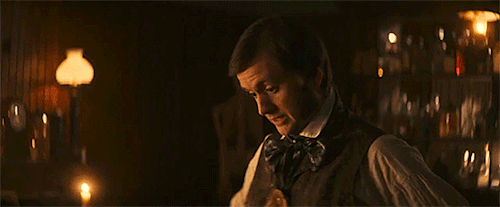
This is already getting real long, so we won't go into the absurdist comedy of the scene in the tomb - suffice to say that the surreal nature of Crowley's bargaining with Elspeth smacks of a fantastic tales of pacts made with the devil. It's delightfully unhinged.
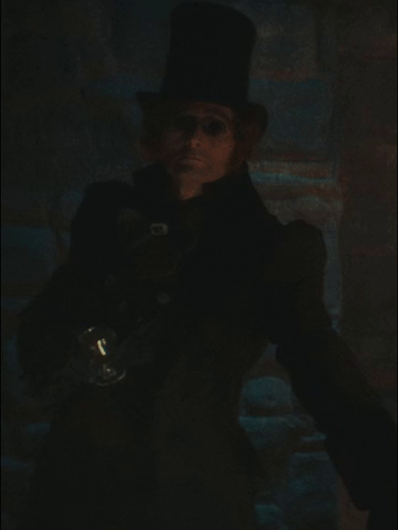
The one line I think worth pointing out?
"Do I sound like a goat?"
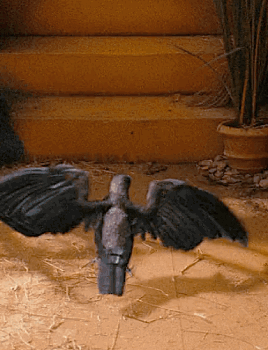
I think this line is key in the narrative connection between the three minisodes in S2. All three flashbacks show Crowley and Aziraphale engaging in acts of deception, but they all have important differences:
In A Companion to Owls, the two work together, and they manage to pull off the trick and evade punishment.
In Nazi Zombies from Hell, Aziraphale comes up with a plan and Crowley goes along with it, and they barely manage to evade punishment.
In The Resurrectionists, Crowley comes up with a plan and Aziraphale goes along with it, and Crowley is sucked down to hell.
I think it's worth noting just how silly Crowley is in the first two minisodes. Bildad and Scottish Crowley are FUN even when dealing real heavy shit. Just a complete joy to watch. And we never see that level of silly from him again. Whatever happened in hell was clearly really bad since the next time we see him in St. James Park he is asking for holy water. He may have moments, but he is never the same.
Questions, comments, additional thoughts? Lay them on me. I'd love to dig into new lines of inquiry on this minisode because I just love it so much <3
Everything Is Meant (long S2 analysis, part 3)
Part one
Part two
There's SO MUCH excellent meta out there right now, and I'm going to try not to reinvent the wheel too much, but I want to keep going with tying the episodes/ elements up together because on first watch it wasn't entirely clear how everything fit. I also strongly recommend a rewatch, no matter what you felt about the ending... if you need to stop it 10 minutes early, do that, but you pick up so much more the second time around.
So: Maggie and Nina. I spent most of my first watch wondering why we were bothering with them, honestly. Later in the season Nina, and then Maggie and Nina, gave Crowley some insightful advice, but their actual relationship didn't progress despite all the meddling, and the amount of emotional investment BOTH Aziraphale and Crowley had in making them get together was frankly strange.
I started thinking in terms of mirror couples, since that was such a big deal in S1 and that's clearly what they were set up to be, but I made the mistake that all of us made on first watch: that Nina was Crowley and Maggie was Aziraphale. It still wasn't really coming together.
Then I put the psych hat back on and started to think about displacement. Displacement is a defense mechanism, and it consists of satisfying an impulse (usually an unconscious one) with a substitute object. At the beginning of the season, Aziraphale and Crowley aren't really in a good place, and I think on some level they know that. Aziraphale is trying to SHOW Crowley that he wants to take the next step through all the casual touches and phone calls and inviting him in, and feeling frustrated because Crowley doesn't seem to be taking the bait. (I absolutely think that Aziraphale tried to get Crowley to stay with him at the bookshop instead of living in his CAR, and Crowley said no. That's a whole other meta.) Meanwhile, Crowley, I think, is waiting for a Grand Gesture. Where did he go, as soon as Aziraphale brought up trying to get two humans to fall in love? Romantic tropes. Getting caught in the rain under an awning. A dramatic kiss that opens someone's eyes. That's the sort of thing he's always done, right? Big rescues, impassioned pleas on the street, fancy dinners, "give you a lift anywhere you want to go". He's defensive and guarded and unlikely to let someone in unless he's CERTAIN he won't be rejected, and Aziraphale's approaches are just too... quiet. No one's fault, they just don't speak the same language.
Then, they're handed the opportunity to make two humans fall in love, and they're both All In immediately. Look at Crowley's face when he summons the rainstorm. This is HUGE for him. Why? Because of displacement. Look at Aziraphale arranging the ball and being borderline deranged about it. They're both desperate to demonstrate what they think it takes for two people to move past their misunderstandings and fall in love. They can't do it for each other because the stakes are too high, and if either of them shows their cards unequivocally the vulnerability feels life-shattering. They're codependent and terrified of rejection and also, importantly, have no idea what they're doing when it comes to love. "Saw it in a film", Crowley says. Aziraphale's read about it in books. But they have zero practical experience.
Instead of learning to communicate, they try to say what they want to say through the medium of Maggie and Nina, up to and including the questionable moral decision to exert control over people's actions and thoughts during the ball. If I can just make this come out right, they both think, then things between us will be alright too. It HAS to come out right. They're attempting to gain some control over their own lives, over something that feels so overwhelming and shattering they can't look directly at it.
It doesn't come out right. Nina's relationship falls apart, but that doesn't mean she's in love with Maggie. While Crowley's stress-cleaning the bookshop to the music that played when Aziraphale got his books back in 1941 (just fuck me up David Arnold), they come in and tell him so. "I don't understand", says Crowley. Because it should have worked. Why didn't it work?
They tell him, of course. "You need to talk to each other. Say what you're really thinking." But here's the thing about communication: you have to learn it. You need to get the hang of expressing your feelings without blaming your partner, and separating intent from impact, and staying away from getting defensive and lashing out. No one has ever taught Aziraphale and Crowley how to do this. It's like Maggie and Nina put Crowley in front of a loom and asked him to recreate the Bayeux Tapestry. He doesn't have the skills; he's always going to get it wrong, even if he tries his hardest.
And he does try. But that's where Maggie and Nina the mirror couple, rather than Maggie and Nina the displacement relationship or Maggie and Nina the Greek chorus, come in. Aziraphale, as Nina, has just ended an incredibly toxic, invasive relationship with Heaven. A relationship that invaded every facet of his life, isolated him, and prevented him from being close to anyone else. "Rebound mess," Nina says. Aziraphale is a rebound mess. He's transferred the responsibility for his emotional wellness to Crowley. Crowley is the person he calls when he's in trouble, or (and this is key) when he wants to report a clever/ good thing he's done, or when he's bored. (At no point did Crowley reference Aziraphale calling him for a solicitous reason-- another problem.) Crowley is meant to take care of him. He forgets, I think, that Crowley is a person with his own wants and needs, just like Maggie and Nina are people with their own wants and needs who don't appreciate being messed with. (I think things would have been much different had Aziraphale BEEN THERE for Maggie and Nina's talk with Crowley, but he wasn't.)
And Maggie-as-Crowley? Lonely. Behind on rent, at risk of being evicted (it's important to note that Aziraphale saves Maggie from losing her record shop, as he couldn't save Crowley from losing his flat). Pining. Awkward. Revolving around Nina like a planet, to the extent that we don't get much of an impression of her otherwise. They realize, there at the end, that they both need to round themselves out before jumping into a relationship. Aziraphale and Crowley need that too. They need to take time apart and learn to be healthy on their own. Unfortunately they don't have the skills to get to that conclusion in a healthy way, so it all explodes in their faces and everything falls apart.
Aziraphale tries to teach Nina and Maggie to dance as a substitute for communication. Nina and Maggie try to teach Crowley communication as a substitute for the dance they've been doing around each other. That's the reason they're a part of the plot: they exist to demonstrate the way Aziraphale and Crowley might have succeeded in forging a better dynamic. Sadly, the boys' dance is too practiced and they got sucked right back into it.
It's okay, I think, that Nina and Maggie's storyline never really went anywhere. It wasn't supposed to. It's an allegory, not something that needs to stand alone.